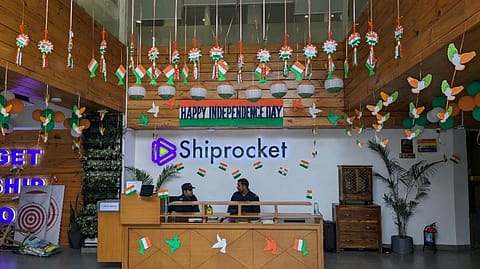Shiprocket's AI push aims to rewrite digital commerce for Bharat
At SHIVIR 2025, Shiprocket unveiled AI tools to democratise tech for 4 lakh merchants, many from smaller cities. Their innovations, including the voice-command Trends tool and Co-pilot assistant, aim to simplify analytics and operations.

If India’s digital commerce is in the middle of a reset, then AI is the new engine — and Shiprocket’s betting big that small sellers will drive it. At its flagship summit, SHIVIR 2025, the logistics tech company unveiled a host of AI-powered tools aimed at democratising tech access for the 4 lakh merchants on its platform — many of them first-time business owners from tier-2 and tier-3 cities.
The narrative is simple, but the implications are vast: "AI is not one thing. It's the way you do things," says Saahil Goel, co-founder and MD of Shiprocket. “It’s the way your employees operate, the way your systems function, and the way your products should work for your customers.”
The first of the announcements is the AI version of Trends — a merchant analytics tool that now accepts voice commands. Built to tackle feedback from users overwhelmed by filters and drop-downs, the new voice interface allows sellers to ask questions like, “Which shirts in Surat are selling best?” or “Is ₹299 a good price for this phone cover?” Crucially, it speaks regional languages and breaks down insights in plain speak — no Excel, no jargon.
"People aren’t used to analytics like pros,” Goel points out. “With voice, they can now just talk. It makes insights accessible for everyone.”
Following that is Co-pilot, Shiprocket’s AI assistant that literally talks back. It acts like a voice-enabled dashboard — answering queries, locating SKU IDs, downloading labels — all via simple commands. It's hands-free, multilingual, and designed to be as intuitive as asking a colleague for help.
But perhaps the most audacious launch is Shunya.ai, built in partnership with AI firm UltraSafe. Positioned as India’s first sovereign, multimodal and agentic AI model, it’s trained on Indian data, operates on Indian servers, and is aimed at solving for Indian merchants — beyond Shiprocket’s own platform.
“There’s no Indian model that does text, image, voice, and documents — and can also do things on your behalf,” Goel says. That last part — “agentic” — is key. This AI doesn’t just answer; it can "execute" for instance, running a conversion audit on your website or identifying 5 fixes to increase traffic — then executing them.
Recommended Stories
The big draw? It reduces the “training curve” for merchants who don’t have time to learn analytics or interfaces. “There’s no training anymore. That means there’s no limit to what a seller can do,” Goel says.
Data, scale, and the 'AI for Bharat' pipeline
The scale is compelling. India now has 886 million active internet users — 55% from rural India — and UPI accounts for 84% of all retail digital payments, according to the Made for Bharat, Powered by AI: The New Age of Commerce report by Shiprocket and KPMG. Plus quick commerce is no longer a metro habit; it’s gone national with a 40% surge in monthly transacting users, over half of whom place 5+ orders a month.
With this backdrop, the potential of AI to shape how Bharat shops, sells, and scales is massive. And Shiprocket wants to ride that wave.
(INR CR)
Internally, Goel says, all engineering teams are being upskilled for AI. The goal is to transition from being an AI-enabled company to an AI-first one. “If engineers get more bandwidth because they’re coding less and thinking more, we don’t cut jobs. We just build more,” he adds.
One of the key reasons Shiprocket is betting on its own LLMs? Cost. “We’re already a well-funded, profitable company, but running third-party LLMs like OpenAI or Anthropic started to hurt,” Goel admits. “If it's pinching us, imagine the strain on 10,000 small businesses.”
That’s why they’ve gone self-hosted — cutting dependency on dollar-priced, global models, and giving themselves a longer runway. Shunya.ai, Goel says, has already been developed with $40 million in prior investments by UltraSafe, which gives Shiprocket the tech without needing to start from scratch.
And the impact of AI on job losses? Goel’s answer is clear: AI doesn’t replace people; it expands their capacity. “I’m not cutting anyone. If the team becomes 10x more productive, we build 4x the stuff. Imagine that.”
The AI rollout will initially focus on Shiprocket’s own merchant base — nearly 4 lakh strong — with feedback loops and use-case iterations to follow. The idea is to get it right before scaling wider.
"AI is going to become a huge budget cost over time. Just like cloud hosting did 10 years ago,” Goel says. “We’re just choosing to solve it today. For ourselves, and for Bharat.”